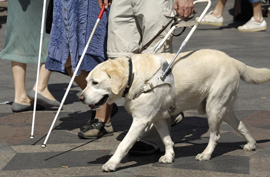
Travel by people with disabilities, also known as "disabled travel" or "accessible travel," is on the rise. The travel industry is waking up to disabled travelers' special needs by providing more services and greater accommodation. Meanwhile, the sheer abundance of information on accessible travel is astounding -- much of it generated by disabled travelers themselves.
The Americans with Disabilities Act guarantees that disabled travelers receive equal treatment under the law. While this would be the case in a perfect world, it doesn't always work out that way in real life, especially in foreign countries where accessibility regulations vary widely. Despite having common sense, considerable public sentiment and strength in numbers, disabled travelers frequently face inadequate facilities, prejudice, misinformation, general hassles and higher prices than other travelers.
Compounding the problem is the fact that there are as many disabilities as there are disabled folks. Each person's needs are a little different, and traveling in cookie-cutter airline seats, hotel rooms and rental car fleets can be very tricky. The following tips and resources will help disabled travelers and their companions anticipate some of the snags of accessible travel.
Disabled Travel Tips
1. Call ahead. Service providers are required by law in many cases to accommodate travelers with special needs. However, most need some time to make the necessary arrangements. Mention your needs at the time of reservation, and call the provider 24 to 48 hours before your arrival to confirm that proper accommodations have been made.
2. Be specific and clear when describing a disability. Not all service providers know the "lingo" of accessible travel, or the medical terms for certain conditions. Give as many details as you can about what you can and can't do, and don't downplay the severity of the disability. The more information a service provider has, the better they will be able to accommodate you.
3. Be specific and clear when describing the trip to your doctor. A doctor can often prescribe measures for coping with an unusually long flight, limited medical facilities at your destination, the unavailability of prescription drugs and other pitfalls of traveling. Be prepared -- in some cases, your doctor may question the advisability of travel. For more information, see Medications for Travel.
4. Take a doctor's note and phone number. Travel with a statement from your doctor, preferably on letterhead, covering your condition, medications, potential complications, special needs and other pertinent information. Be sure you have a number where your doctor (or another medical professional) can be reached in an emergency situation at any hour of the day.

Safety and Health Tips for Travelers
5. Bring extra medication. Many experts advise that you travel with two complete packages of essential medication in case of emergency. Store all medications and other necessary medical supplies in your carry-on bag.
6. Investigate physician availability where you will be traveling. Your doctor, health care provider, insurance company or local embassy can provide the names and contact numbers of physicians at your destination. For more information, see Health Care Abroad.
7. Carry medical alert information, preferably in a place that a medical professional or anyone who assists you will find easily (wallet card, necklace, close to your identification).
8. Consider using a specialist travel agent. Some agents provide stellar niche services; one might be very experienced in working with hearing-impaired travelers, another with developmentally impaired travelers. Since the requirements for these varied travelers can be staggeringly different, it helps to find someone who knows the ropes. Check the agent search feature at TravelSense.org to find qualified travel agents across the U.S.

9. Avoid connecting flights. Although wheelchairs are the last items to be checked into the luggage compartments, and thus first to be pulled off, flying direct can save you unnecessary time and hassle. One exception: If you have trouble maneuvering into airplane lavatories, long flights may become uncomfortable -- so a series of shorter flights might be a better option. If you do choose to connect, be sure to allow plenty of time between flights (we'd recommend at least 90 minutes, or two hours if you need to go through customs or security) to get from one gate to the next.

10 Ways to Survive a Long-Haul Flight
10. Allow plenty of time before your flight to check in, get through security and transfer to your gate. Arrive at least two hours before a domestic flight and three hours before an international flight -- more if you're traveling at a peak time.
11. Check in with your flight attendant before your plane lands to make a plan for exit.
12. Don't forget about transportation to and from the airport. If you have a wheelchair, make arrangements in advance to have an accessible vehicle pick you up in your destination city.
13. Bring spare parts and tools. Wheelchairs can take tremendous abuse while traveling; assemble a small kit of spare parts and tools for emergency repairs. You may also be required to dismantle a wheelchair for certain flights or activities; make sure you and your traveling companions know how to do this.
14. Know your rights. Before going through airport security, be aware of the TSA's rules for travelers with disabilities and medical conditions. The U.S. Department of Transportation's Aviation Consumer Protection Division has a comprehensive guide to the rights of disabled air travelers.
Useful Web Sites and Resources
For more information on traveling with all types of disabilities, check out the Web sites and other resources below.

Accessible Journeys: Tour operator for slow walkers, wheelchair travelers and their companions

Barrier-FreeCruising.com: Tips and resources for disabled cruise travelers

Barrier-FreeTravel.com: Accommodations and advice for disabled travelers

CruiseCritic.com: Info on cruising with a disability

DisabledTravelers.com: Comprehensive listing of accessible travel specialists around the world

Disabled Traveler's Guide to the World: Travel tips and destination guides for disabled travelers


Emerging Horizons: An online quarterly newsletter providing a wide range of information for mobility-impaired travelers

Gimp on the Go: Destination guides, travel tips, photo gallery and resources for disabled travelers

Global Access News: Resources and tips for disabled travelers

TravelGuides.org: A wealth of tour operators, travel agents, hotels, attractions and more that cater to disabled travelers

Travel on the Level: Tips and destination recommendations for travelers looking for less strenuous walking and fewer stairs

World on Wheelz: Agency specializing in accessible getaways for wheelchair travelers, slow walkers and seniors with special needs
 Travel by people with disabilities, also known as "disabled travel" or "accessible travel," is on the rise. The travel industry is waking up to disabled travelers' special needs by providing more services and greater accommodation. Meanwhile, the sheer abundance of information on accessible travel is astounding -- much of it generated by disabled travelers themselves.
Travel by people with disabilities, also known as "disabled travel" or "accessible travel," is on the rise. The travel industry is waking up to disabled travelers' special needs by providing more services and greater accommodation. Meanwhile, the sheer abundance of information on accessible travel is astounding -- much of it generated by disabled travelers themselves. Safety and Health Tips for Travelers
Safety and Health Tips for Travelers 9. Avoid connecting flights. Although wheelchairs are the last items to be checked into the luggage compartments, and thus first to be pulled off, flying direct can save you unnecessary time and hassle. One exception: If you have trouble maneuvering into airplane lavatories, long flights may become uncomfortable -- so a series of shorter flights might be a better option. If you do choose to connect, be sure to allow plenty of time between flights (we'd recommend at least 90 minutes, or two hours if you need to go through customs or security) to get from one gate to the next.
9. Avoid connecting flights. Although wheelchairs are the last items to be checked into the luggage compartments, and thus first to be pulled off, flying direct can save you unnecessary time and hassle. One exception: If you have trouble maneuvering into airplane lavatories, long flights may become uncomfortable -- so a series of shorter flights might be a better option. If you do choose to connect, be sure to allow plenty of time between flights (we'd recommend at least 90 minutes, or two hours if you need to go through customs or security) to get from one gate to the next. 10 Ways to Survive a Long-Haul Flight
10 Ways to Survive a Long-Haul Flight Accessible Journeys: Tour operator for slow walkers, wheelchair travelers and their companions
Accessible Journeys: Tour operator for slow walkers, wheelchair travelers and their companions Barrier-FreeCruising.com: Tips and resources for disabled cruise travelers
Barrier-FreeCruising.com: Tips and resources for disabled cruise travelers Barrier-FreeTravel.com: Accommodations and advice for disabled travelers
Barrier-FreeTravel.com: Accommodations and advice for disabled travelers CruiseCritic.com: Info on cruising with a disability
CruiseCritic.com: Info on cruising with a disability DisabledTravelers.com: Comprehensive listing of accessible travel specialists around the world
DisabledTravelers.com: Comprehensive listing of accessible travel specialists around the world Disabled Traveler's Guide to the World: Travel tips and destination guides for disabled travelers
Disabled Traveler's Guide to the World: Travel tips and destination guides for disabled travelers
 Emerging Horizons: An online quarterly newsletter providing a wide range of information for mobility-impaired travelers
Emerging Horizons: An online quarterly newsletter providing a wide range of information for mobility-impaired travelers Gimp on the Go: Destination guides, travel tips, photo gallery and resources for disabled travelers
Gimp on the Go: Destination guides, travel tips, photo gallery and resources for disabled travelers Global Access News: Resources and tips for disabled travelers
Global Access News: Resources and tips for disabled travelers TravelGuides.org: A wealth of tour operators, travel agents, hotels, attractions and more that cater to disabled travelers
TravelGuides.org: A wealth of tour operators, travel agents, hotels, attractions and more that cater to disabled travelers Travel on the Level: Tips and destination recommendations for travelers looking for less strenuous walking and fewer stairs
Travel on the Level: Tips and destination recommendations for travelers looking for less strenuous walking and fewer stairs World on Wheelz: Agency specializing in accessible getaways for wheelchair travelers, slow walkers and seniors with special needs
World on Wheelz: Agency specializing in accessible getaways for wheelchair travelers, slow walkers and seniors with special needs